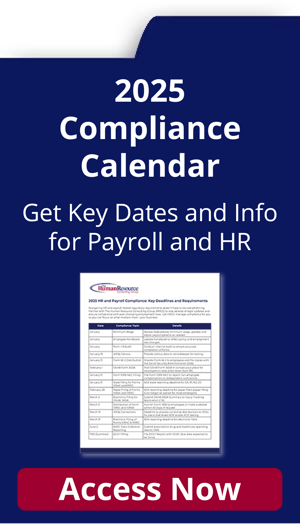On July 4th, 2025, the One Big Beautiful Bill Act (OBBBA) was signed into law, offering a handful of tax deductions for eligible employees. However, for employees to take advantage of the new tax deductions, employers must adhere to the necessary reporting requirements.
In this article, employers can get an overview of the new law, reviewing the key tax deductions offered to employees, understanding employee eligibility, and what your business needs to know for complete reporting and recordkeeping compliance.
What's Included in the One Big Beautiful Bill Act (H.R.1.)?
The primary tax deductions employers will want to focus on, included in the OBBBA are as follows:
- “No Tax on Tips”
- “No Tax on Overtime”
- “No Tax on Car Loan Interest”
- Additional Tax Deductions for Seniors
Each of these tax deductions is in effect for the 2025 through 2028 tax years and can be claimed either through an itemized deduction or a standard deduction (non-itemized).
“No Tax on Tips” Provision
Under the OBBBA, tipped employees, including self-employed individuals, can claim a tax deduction that will allow them to deduct any qualified tips received from their job.
Qualified tips are defined as any voluntary cash or charged tips received from customers. Tips given to employees who are paid through a tip-sharing system also count as qualified tips.
Employees can deduct up to $25,000 annually. However, for self-employed individuals, deductions cannot exceed their net income from the trade or business through which the tips were earned.
The tax deduction phases out by $100 for each $1,000 that exceeds the employee’s modified adjusted gross income (MAGI) cap of $150,000. For employees who are jointly filing, the cap is increased to $300,000.
Employee Eligibility
For the deduction to count, the IRS must list the employee’s job as an occupation that customarily and regularly receives tips on or before December 31st, 2024.
Common occupations that qualify include:
- Food service employees, including bartenders, waitstaff, and cooks
- Performers, including dancers, musicians, and digital content creators
- Hospitality staff, including hotel desk clerks, concierges, and bellhops
When claiming the tax deduction, employees must ensure that their social security number is on their tax return, and if married, the employee must also file jointly to remain eligible.
Self-employed individuals in a Specified Service Trade or Business (SSTB) under section 199A, OR employees whose employer is an SSTB, are considered not eligible for the No Tax on Tips deduction.
Key Takeaways
Aside from keeping track of eligible employees for the No Tax on Tips deduction, employers must file W-2 Forms to the IRS and the employee, outlining the amount of cash tips received and the employee’s occupation. This ensures employees have accurate information when filing their taxes and claiming the deduction.
For many employers, using modern payroll software can make the reporting process effortless with tools that will prepare Form W-2s for sending to the IRS while also managing employee compensation regarding tipped wages.
“No Tax on Overtime” Provision
For employees eligible for overtime pay, as outlined in the Fair Labor Standards Act (FLSA), employees can deduct any overtime compensation that exceeds their regular rate of pay. This would include the “half” portion of the “time-and-a-half” compensation that is required by FLSA.
Using Connecticut’s minimum wage for 2025 as an example, if an employee is paid an hourly rate of $16.35 and works one whole hour of overtime, resulting in a $24.53 compensation rate, that extra $8.18 is deductible under the OBBBA provision.
Employees can deduct up to $12,500 annually. For employees filing jointly, the maximum deduction is capped at $25,000.
In the same way the No Tax on Tips deduction functions, the tax deduction phases out by $100 for each $1,000 that exceeds the employee’s modified adjusted gross income (MAGI) cap of $150,000. For employees who are jointly filing, the cap is increased to $300,000.
Employee Eligibility
For an employee to be eligible for the No Tax on Overtime provision, employees cannot be exempt from overtime pay based on their FLSA classification.
Generally, employees who are considered the following are exempt from overtime pay:
- Executives
- Professional Staff (learned and creative roles)
- Certain computer employees
- Outside sales
- Administrative professionals involved in business operations who have decision-making authority
Employees are also required to include their Social Security number on their tax return and, if married, file jointly for the deduction to remain eligible.
Key Takeaways
Similar to the No Tax on Tips deduction, employers should keep track of eligible employees, but most importantly, must report overtime compensation on Form W-2s.
Beginning for the 2025 tax year, employers will now be required to fill out the amount of overtime compensation for a given employee.
It’s critical to understand that deductible overtime compensation refers to federal law only under the FLSA; overtime compensation earned through state-specific laws is not eligible for the No Tax on Overtime provision.
The most efficient way to keep track of overtime compensation is to utilize a time and attendance software that tracks employee overtime hours and compensation for extra time accrued for accurate reporting.
Other Notable Tax Deductions Offered in the One Big Beautiful Bill Act
The provisions outlined in the OBBBA include several notable tax deductions that will benefit workers when filing their personal tax returns. However, employers should be aware of them, as employees may have questions about them and whether they are related to their pay statements, Form W-2s, or employee-sponsored benefits.
“No Tax on Car Loan Interest” Provision
This tax deduction allows individuals to deduct any interest paid on a loan to purchase a qualified vehicle. The vehicle identification number (VIN) must be provided on the tax return to be eligible for the tax deduction. Lease payments are not considered eligible.
Individuals can claim a maximum annual deduction of up to $10,000. The tax deduction phases out by $100 for each $1,000 that exceeds the individual’s modified adjusted gross income (MAGI) cap of $100,000. For individuals jointly filing, the cap is increased to $200,000.
It’s critical to note that employers themselves cannot claim this deduction if the vehicle is used for business purposes. Employers can instead take advantage of the Standard Mileage Rate or the Actual Expense methods for business vehicle tax deductions.
How to Address Employee Questions
Businesses with employees who use their personal vehicles frequently on the job may inquire about the car interest loan deduction and whether the employer is responsible for outlining information through pay statements.
Employers should communicate to staff members that any vehicle expenses incurred on the job will be handled through the business’s reimbursement policies and that the No Tax on Car Interest Loans only apply to personal tax returns.
Additional Tax Deductions for Seniors
For individuals 65 and older, an additional deduction of $6,000 can be claimed in addition to the standard deduction for seniors. The deduction amount applies to each eligible individual, which can be up to $12,000 for married couples.
The tax deduction phases out by $100 for each $1,000 that exceeds the individual’s modified adjusted gross income (MAGI) cap of $75,000. For individuals jointly filing, the cap is increased to $150,000.
How to Address Employee Questions
Some employees aged 65 or older may have concerns about whether the senior tax deduction affects their paycheck or employer-sponsored benefits. It’s important to clarify that the tax deduction is for their personal tax return only and that wages, benefits, or other payroll withholdings are not subject to change.
Stay Up-to-Date with Regulatory Compliance
The OBBBA is just the tip of the iceberg when it comes to new and updated labor law regulations. Businesses scramble to keep up with not just federal regulations, such as the OBBBA, but state and local labor laws.
In addition to these changes under the OBBBA, employers should be prepared for additional I-9 Audits with recent changes to immigration policies under the current administration.
It’s a must for your business to adhere to regulatory compliance, or else you’ll be faced with penalties that can affect your bottom line. Having an HR consulting service support your business’s compliance processes can help reduce those risks for your company.
Contact us today to get additional help on the OBBBA and anything HR and payroll compliance.







